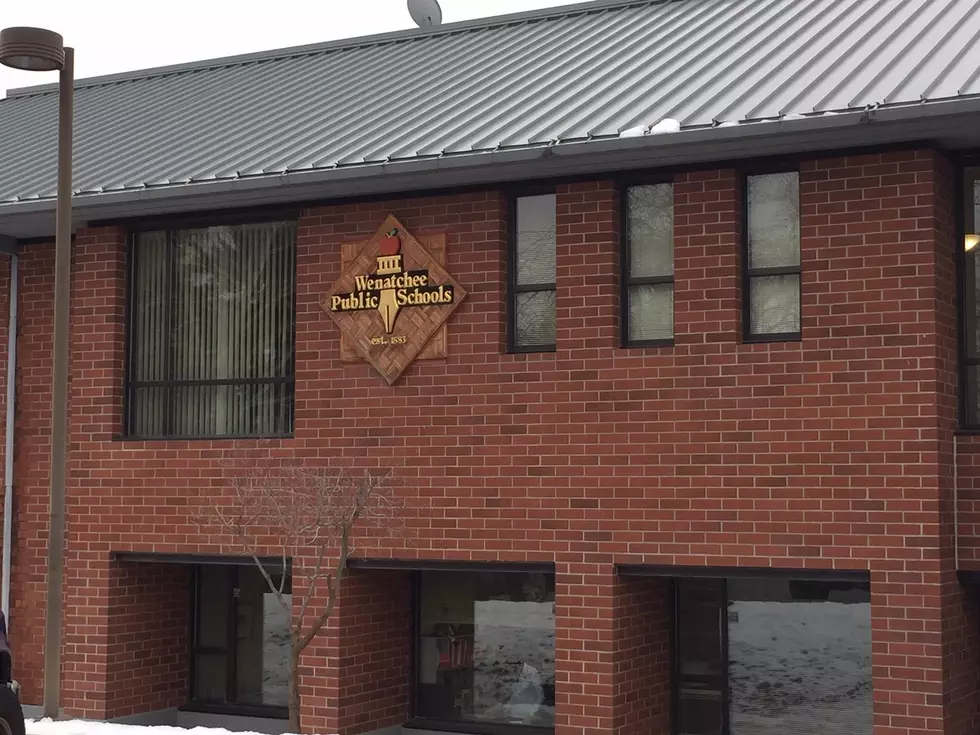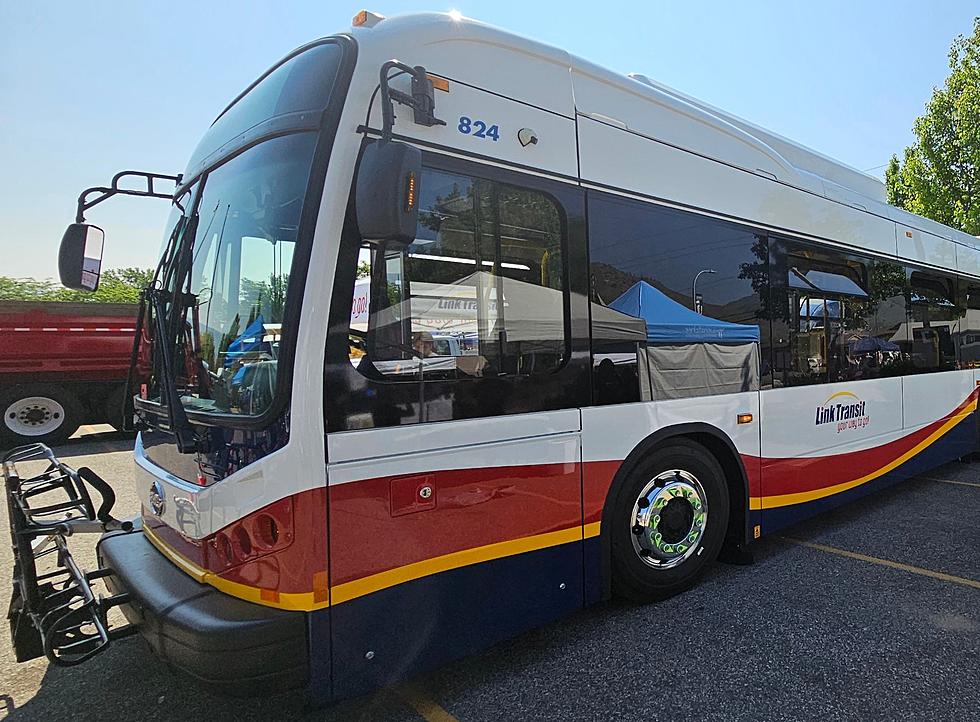
Wenatchee Superintendent Responds To Mailer Critical Of District
The Wenatchee School District is reacting to a mailer sent out last week highly critical of student performance and what the mailer calls a political agenda.
Superintendent Kory Kalahar, Ed.D has written an opinion editorial defending district practices and policies he says supports students who are faced with hardships such as poverty.
According to Kalahar, 60% Wenatchee school students are living in poverty, 22% are English Language Learners,14% are migrant learners, and 16% qualify for special education services.
District spokesperson Diana Haglund says the mailer was full of misinformation.
"It contained false narratives and misleading headlines about the Wenatchee School District, our students, our staff," said Haglund.
The mailer, which is labeled “The Wenatchee Record”, features opinion pieces by two people running for Wenatchee School Board in the current election - Randy Smith and Tricia Cleek.
Haglund said the mailer came with a partisan agenda.
“We made it clear that we considered that mailer to be political propaganda,” Haglund said. “That was our first response.”
The mailer claims there is promotion of transgender ideology, and that parents are unaware of many policies including new mental health teletherapy programs for children.
It was paid for by Glenn M. Dobbs. Glenn Dobbs served one term in the Washington House of Representatives for Spokane from 1985 to 1987.
The mailer says Wenatchee Schools are failing and references state testing which it says shows a 71% failure rate for math, 65% for science and 54% for language skills.
In his editorial, Kalahar says the Smarter Balanced Assessment (SBA) tests the mailer references are administered to students in specific grades, and that students are counted as not meeting their grade level if they don't take the test. About 3.5% of families decline the tests for their kids.
Kalahar said teachers conduct their own assessments and diagnostic tests, and claimed SBA data alone is limiting and does not evaluate students' achievements or growth holistically.
He also said based on the SBA data, Wenatchee students are performing slightly below the state average. But when compared to schools with similar enrollment and demographics, Wenatchee students are performing equally or better.
In his piece, Kalahar did not directly address the mailer’s accusations of the district having a political agenda but did focus on gender inclusivity. He noted their adopted policies and procedures related to gender inclusivity are required by state law. He said civil rights laws protect gender expression and gender identity in Washington public schools.
In addition, Kalahar said the district is dealing with a mental health crisis among students, which leads to more school absences and causes students to fall behind academically.
Kalahar's opinion editorial appeared to be directed to parents of Wenatchee school students, although there was no formal designation.
He said the mailer was disguised as a newspaper and contained misleading information which he wanted to clarify and set the record straight on.
Read the complete text of Kalahar's opinion editorial below:
The Wenatchee School District has been the subject of a recent mailer disguised as a newspaper that contained misleading information about our schools. As the superintendent, I want to clarify the facts and set the record straight.
I want you to know that I deeply care about your children and the educators and staff who work tirelessly to provide them with a quality education. As members of the same community, we are not just acquaintances but friends, neighbors, and family members. Wenatchee School District (WSD) takes great pride in the success of our students and the highly skilled employees who contribute to making the District a place where students can thrive and prepare for their future. We are all on the same side when it comes to realizing the importance of educating our students, and through conversations, collaboration, and education on what actually is happening in each of our schools, we come together as a community to support our students.
Understanding our data starts with understanding our learners
WSD is committed to serving a diverse population of learners, each with unique lived experiences, starting points, and needs. Out of 7,413 students, 60% of them are living in poverty, 22% are English Language Learners,14% are migrant learners, and 16% qualify for special education services. While these challenges may affect performance on a state assessment, it does not mean students are not learning and growing. In fact, many of these students are making significant progress in their education despite the obstacles they face. Wenatchee students grew by 40.2% in Math and 39.6% in ELA, according to the state report card (most current data from 18-19).
As educators, it is our responsibility to recognize this data to address these challenges, providing targeted support and resources to help students overcome them. By doing so, we can help each student reach their unlimited potential, regardless of their starting point. It's important to remember that test scores do not always measure success and that every student has the ability to achieve greatness with support and guidance.
State Superintendent Reykdal has never said Wenatchee School District is failing
The state report card is published online by the Office of the Superintendent of Public Instruction. It tracks various metrics for all Washington schools and includes demographic information on students and staff and Smarter Balanced Assessment (SBA) data. It is meant to be informational.
Using SBA data alone to judge school performance is not accurate
It's important to note that SBA tests only provide a snapshot of student performance and do not represent the total student population. These tests are administered to grades 3-8 & 10, but 3.5% of Wenatchee families opt their students out of taking them. If a student doesn't take the test, they are counted as not meeting the grade level standard. This means that the test results don't accurately reflect the performance of all Wenatchee students. To more accurately monitor student learning and growth, our educators administer regular assessments and diagnostic tests. This data is used to identify necessary supports for students and adjust instruction. The bottom line is that using SBA data alone is limiting and does not evaluate students' achievements or growth holistically. Our students are so much more than a standardized test score.
In comparison to the state SBA totals, students in Wenatchee are performing slightly below the state average. However, when matched with peer schools with similar enrollment and demographics, Wenatchee students are performing equally or better. To make a more accurate comparison, we recently shared this data with our school board at their September 12th meeting. To be clear, we’re not satisfied with our data and we are using research and best practices to improve instruction and increase student growth in all areas of their learning. We have a bold new strategic plan to help guide our work that includes action steps intent on building a strong academic foundation for all students.
High graduation rates and lower state assessment scores are not mutually exclusive
Passing the Smarter Balanced test is not a graduation requirement. To graduate in the state of Washington, a student must earn a minimum of 24 credits (or 30 credits for high standards schools such as WHS), complete a High School and Beyond Plan and a Graduation Pathway, which could be completed through the Armed Services Vocational Aptitude Battery (ASVAB), Career and Technical Education (CTE) sequence, English Language Arts (ELA) or Math sequence or pass the SBA. Wenatchee’s on-time (4-year) graduation rate is 85% (Wenatchee High School and WestSide). The state average is 82%.
Our gender inclusivity policy is a state law
WSD makes it a priority that each student is seen, valued, feels safe, and knows they belong. Research (such as Geoffrey Cohen, Stanford University) shows that feeling a sense of safety and belonging improves academic outcomes for students. Our adopted policies and procedures related to gender inclusivity are mandated by Washington state law. Civil rights laws prohibit discrimination and discriminatory harassment on the basis of gender expression and gender identity in Washington public schools.
We provide safe spaces for all students
Maintaining safe spaces in our schools for all students is a priority. According to state law, all schools shall allow transgender students to use the restroom and locker room that corresponds to their gender identity while also providing alternative facilities for students who desire increased privacy. Any student – transgender or not, who has a need or desire for increased privacy, regardless of the underlying reason, is provided access to an alternative restroom (e.g., staff restroom, health office restroom, etc.). This allows students who may feel uncomfortable sharing the facility with the transgender student(s) the option to make use of a separate restroom and have their concerns addressed without stigmatizing any individual student.
There is a mental health crisis taking place in our youth
Make no mistake, the mental health crisis in students is real, and it’s impacting schools. Studies (such as the Center for Disease Control’s (CDC’s) Youth Risk Behavior Surveillance System) have shown that mental health challenges, such as anxiety and depression, are on the rise among young people. This can lead to difficulties with focus, learning, and behavior in the classroom. Additionally, students experiencing mental health challenges may be more likely to miss school, which can lead to falling behind academically. Unfortunately, in our valley, state, and nation, access to behavioral health services has been at an all-time low post-pandemic.
Schools are often on the front line of addressing mental health issues in young people. Teachers and other school staff members are often the first to notice changes in a student's behavior or mood. As a result, schools are increasingly expected to provide mental health services and support to students. To address this challenge, WSD has implemented research-backed social-emotional learning practices that help students build resilience, relationships, and coping skills to navigate the challenges of today. We’ve also partnered with local trusted healthcare provider, Columbia Valley Community Health (CVCH), to connect students to services, but it’s not enough to meet the demand. A grant from the Office of the Superintendent of Public Instruction (OSPI) has allowed us to expand access to mental health care for students age 10+ through virtual visits with a qualified therapist from Daybreak Health. WSD partners with our parents and families to share information on accessing these optional services.
Our students are counting on us to come together
We want to assure you that the Wenatchee School District is committed to providing a high-quality public education to all our students. We believe in being transparent in our communication and decision-making, and we encourage you to ask questions and seek factual information if you have any doubts. In these challenging times, it's more important than ever to come together as a community to support our students and ensure their success. We appreciate your trust in us and are looking forward to working alongside you to improve student outcomes.
More From NewsRadio 560 KPQ









